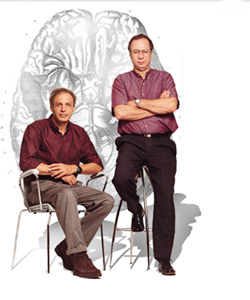Are you a journalist? Please sign up here for our press releases
Subscribe to our monthly newsletter:
"Today's brain research is based the collaboration between mathematicians, physicists, chemists, and biologists. But the day is near when you will find experts specializing in the specific sciences comprising brain research.The multidisciplinary integration of which we are so proud today will take place in the brains of these experts, between their left and right ears."
Prof. Shimon Ullman
Director of the Moross Laboratory for Vision Research and Robotics
Prof. Ullman holds the Ruth and Sami Cohn Chair of Computer Science

How do we guide our hand to a cookie at the center of a dish? How do toddlers manage to learn their mother tongue - and several other languages? Could these complex actions, and many others, be governed by fixed codes? Hundreds of scientists around the world are joining forces to find the answers to such questions.
With the new century only a matter of months away, the Weizmann Institute is launching a task force in an effort to uncover and disclose the most basic, predetermined activity code of the brain. Participating in this specialized research group are neurobiologists, mathematicians, computer scientists, physicists, and chemists, working at the Norman and Helen Asher Center for Brain Imaging and the Arison Laboratory for Human Brain Imaging.Thanks to this combination of disciplines, Institute scientists are making a vital contribution to the worldwide effort to study the brain. At their disposal is an immensely powerful combination of advanced technologies, some of which were invented and developed by Institute scientists.
Understanding the brain may yield advanced healing methods, including sensory replacement. Application of the brain's mode of operation may bring forth computers and robots able to communicate independently with and adapt to their ever-changing environment. Medicine and industry will be unrecognizably transformed. One day in the third millennium, when the brain's code - or codes - are discovered and deciphered, the Weizmann Institute will be remembered as a prime mover in this field.